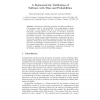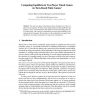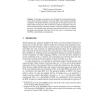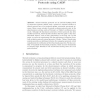104
click to vote
FORMATS
2010
Springer
15 years 3 days ago
2010
Springer
In an expected reachability-time game (ERTG) two players, Min and Max, move a token along the transitions of a probabilistic timed automaton, so as to minimise and maximise, respec...
139
click to vote
FORMATS
2010
Springer
15 years 3 days ago
2010
Springer
Abstract. Probabilistic timed automata are an extension of timed automata with discrete probability distributions. Simulation and bisimulation relations are widely-studied in the c...
134
click to vote
FORMATS
2010
Springer
15 years 3 days ago
2010
Springer
Abstract. We consider temporal logic formulae specifying constraints in continuous time and space on the behaviors of continuous and hybrid dynamical system admitting uncertain par...
111
click to vote
FORMATS
2010
Springer
15 years 3 days ago
2010
Springer
Abstract. Quantitative verification techniques are able to establish system properties such as "the probability of an airbag failing to deploy on demand" or "the exp...
141
click to vote
FORMATS
2010
Springer
15 years 3 days ago
2010
Springer
Abstract. We investigate layered composition for real-time systems modelled as (networks of) timed automata (TA). We first formulate the principles of layering and transition indep...
158
click to vote
FORMATS
2010
Springer
15 years 3 days ago
2010
Springer
We present a general approach to combine symbolic state space representations for the discrete and continuous parts in the synthesis of winning strategies for timed reachability ga...
144
click to vote
FORMATS
2010
Springer
15 years 3 days ago
2010
Springer
We study two-player timed games where the objectives of the two players are not opposite. We focus on the standard notion of Nash equilibrium and propose a series of transformation...
FORMATS
2010
Springer
15 years 3 days ago
2010
Springer
Abstract. In this paper we propose a novel technique for constructing timed automata from properties expressed in the logic MTL, under bounded-variability assumptions. We handle fu...
113
click to vote
FMICS
2010
Springer
15 years 3 days ago
2010
Springer
Mutual exclusion protocols are an essential building block of concurrent systems: indeed, such a protocol is required whenever a shared resource has to be protected against concurr...
122
click to vote
FMAM
2010
15 years 3 days ago
2010
: In this paper, we present the experience gained with the participation in a case study in which a novel high-level design language (UML4SOA) was used to produce a service-oriente...




